- Home
- Patrick Rothfuss
The Wise Man's Fear tkc-2 Page 2
The Wise Man's Fear tkc-2 Read online
Page 2
Graham stopped. “Lord and lady, I sound like my old da.” He tucked in his chin and added some gruff to his voice. “Back when I was a boy we had proper weather. The miller kept his thumb off the scale and folk knew to look after their own business.”
The innkeeper’s face grew a wistful smile. “My father said the beer was better, and the roads had fewer ruts.”
Graham smiled, but it faded quickly. He looked down, as if uncomfortable with what he was about to say. “I know you aren’t from around here, Kote. That’s a hard thing. Some folk think a stranger can’t hardly know the time of day.”
He drew a deep breath, still not meeting the inkeeper’s eyes. “But I figure you know things other folk don’t. You’ve got sort of a wider view.” He looked up, his eyes serious and weary, dark around the edges from lack of sleep. “Are things as grim as they seem lately? The roads so bad. Folk getting robbed and . . .”
With an obvious effort, Graham kept himself from looking at the empty piece of floor again. “All the new taxes making things so tight. The Grayden boys about to lose their farm. That spider thing.” He took another swallow of beer. “Are things as bad as they seem? Or have I just gotten old like my da, and now everything tastes a little bitter compared to when I was a boy?”
Kote wiped at the bar for a long moment, as if reluctant to speak. “I think things are usually bad one way or another,” he said. “It might be that only us older folk can see it.”
Graham began to nod, then frowned. “Except you’re not old, are you? I forget that most times.” He looked the red-haired man up and down. “I mean, you move around old, and you talk old, but you’re not, are you? I’ll bet you’re half my age.” He squinted at the innkeeper. “How old are you, anyway?”
The innkeeper gave a tired smile. “Old enough to feel old.”
Graham snorted. “Too young to make old man noises. You should be out chasing women and getting into trouble. Leave us old folk to complain about how the world is getting all loose in the joints.”
The old carpenter pushed himself away from the bar and turned to walk toward the door. “I’ll be back to talk to your scribe when we break for lunch today. I en’t the only one, either. There’s a lot of folks that’ll want to get some things set down official when they’ve got the chance.”
The innkeeper drew a deep breath and let it out slowly. “Graham?”
The man turned with one hand on the door.
“It’s not just you,” Kote said. “Things are bad, and my gut tells me they’ll get worse yet. It wouldn’t hurt a man to get ready for a hard winter. And maybe see that he can defend himself if need be.” The innkeeper shrugged. “That’s what my gut tells me, anyway.”
Graham’s mouth set into a grim line. He bobbed his head once in a serious nod. “I’m glad it’s not just my gut, I suppose.”
Then he forced a grin and began to cuff up his shirt sleeves as he turned to the door. “Still,” he said, “you’ve got to make hay while the sun shines.”
Not long after that the Bentons stopped by with a cartload of late apples. The innkeeper bought half of what they had and spent the next hour sorting and storing them.
The greenest and firmest went into the barrels in the basement, his gentle hands laying them carefully in place and packing them in sawdust before hammering down the lids. Those closer to full ripe went to the pantry, and any with a bruise or spot of brown were doomed to be cider apples, quartered and tossed into a large tin washtub.
As he sorted and packed, the red-haired man seemed content. But if you looked more closely you might have noticed that while his hands were busy, his eyes were far away. And while his expression was composed, pleasant even, there was no joy in it. He did not hum or whistle while he worked. He did not sing.
When the last of the apples were sorted, he carried the metal tub through the kitchen and out the back door. It was a cool autumn morning, and behind the inn was a small, private garden sheltered by trees. Kote tumbled a load of quartered apples into the wooden cider press and spun the top down until it no longer moved easily.
Kote cuffed up the long sleeves of his shirt past his elbows, then gripped the handles of the press with his long, graceful hands and pulled. The press screwed down, first packing the apples tight, then crushing them. Twist and regrip. Twist and regrip.
If there had been anyone to see, they would have noticed his arms weren’t the doughy arms of an innkeeper. When he pulled against the wooden handles, the muscles of his forearms stood out, tight as twisted ropes. Old scars crossed and recrossed his skin. Most were pale and thin as cracks in winter ice. Others were red and angry, standing out against his fair complexion.
The innkeeper’s hands gripped and pulled, gripped and pulled. The only sounds were the rhythmic creak of the wood and the slow patter of the cider as it ran into the bucket below. There was a rhythm to it, but no music, and the innkeeper’s eyes were distant and joyless, so pale a green they almost could have passed for grey.
CHAPTER TWO
Holly
Chronicler reached the bottom of the stairs and stepped into the Waystone’s common room with his flat leather satchel over one shoulder. Stopping in the doorway, he eyed the red-haired innkeeper hunched intently over something on the bar.
Chronicler cleared his throat as he stepped into the room. “I’m sorry to have slept so late,” he said. “It’s not really . . .” He stalled out when he saw what was on the bar. “Are you making a pie?”
Kote looked up from crimping the edge of the crust with his fingers. “Pies,” he said, stressing the plural. “Yes. Why?”
Chronicler opened his mouth, then closed it. His eyes flickered to the sword that hung, grey and silent behind the bar, then back to the red-haired man carefully pinching crust around the edge of a pan. “What kind of pie?”
“Apple.” Kote straightened and cut three careful slits into the crust covering the pie. “Do you know how difficult it is to make a good pie?”
“Not really,” Chronicler admitted, then looked around nervously. “Where’s your assistant?”
“God himself can only guess at such things,” the innkeeper said. “It’s quite hard. Making pies, I mean. You wouldn’t think it, but there’s quite a lot to the process. Bread is easy. Soup is easy. Pudding is easy. But pie is complicated. It’s something you never realize until you try it for yourself.”
Chronicler nodded in vague agreement, looking uncertain as to what else might be expected of him. He shrugged the satchel off his shoulder and set it on a nearby table.
Kote wiped his hands on his apron. “When you press apples for cider, you know the pulp that’s left over?”
“The pomace?”
“Pomace,” Kote said with profound relief. “That’s what it’s called. What do people do with it, after they get the juice out?”
“Grape pomace can make a weak wine,” Chronicler said. “Or oil, if you’ve got a lot. But apple pomace is pretty useless. You can use it as fertilizer or mulch, but it’s not much good as either. Folk feed it to their livestock mostly.”
Kote nodded, looking thoughtful. “It didn’t seem like they’d just throw it out. They put everything to use one way or another around here. Pomace.” He spoke as if he were tasting the word. “That’s been bothering me for two years now.”
Chronicler looked puzzled. “Anyone in town could have told you that.”
The innkeeper frowned. “If it’s something everyone knows, I can’t afford to ask,” he said.
There was the sound of a door banging closed, followed by a bright, wandering whistle. Bast emerged from the kitchen carrying a bristling armload of holly boughs wrapped in a white sheet.
Kote nodded grimly and rubbed his hands together. “Lovely. Now how do we—” His eyes narrowed. “Are those my good sheets?”
Bast looked down at the bundle. “Well Reshi,” he said slowly, “that depends. Do you have any bad sheets?”
The innkeeper’s eyes flashed angrily for a second, t
hen he sighed. “It doesn’t matter, I suppose.” He reached over and pulled a single long branch from the bundle. “What do we do with this, anyway?”
Bast shrugged. “I’m running dark on this myself, Reshi. I know the Sithe used to ride out wearing holly crowns when they hunted the skin dancers. . . .”
“We can’t walk around wearing holly crowns,” Kote said dismissively. “Folk would talk.”
“I don’t care what the local plods think,” Bast murmured as he began to weave several long, flexible branches together. “When a dancer gets inside your body, you’re like a puppet. They can make you bite out your own tongue.” He lifted a half-formed circle up to his own head, checking the fit. He wrinkled his nose. “Prickly.”
“In the stories I’ve heard,” Kote said, “holly traps them in a body, too.”
“Couldn’t we just wear iron?” Chronicler asked. The two men behind the bar looked at him curiously, as if they’d almost forgotten he was there. “I mean, if it’s a faeling creature—”
“Don’t say faeling,” Bast said disparagingly. “It makes you sound like a child. It’s a Fae creature. Faen, if you must.”
Chronicler hesitated for a moment before continuing. “If this thing slid into the body of someone wearing iron, wouldn’t that hurt it? Wouldn’t it just jump out again?”
“They can make you bite. Out. Your own. Tongue,” Bast repeated, as if speaking to a particularly stupid child. “Once they’re in you, they’ll use your hand to pull out your own eye as easy as you’d pick a daisy. What makes you think they couldn’t take the time to remove a bracelet or a ring?” He shook his head, looking down as he worked another bright green branch of holly into the circle he held. “Besides, I’ll be damned if I’m wearing iron.”
“If they can jump out of bodies,” Chronicler said. “Why didn’t it just leave that man’s body last night? Why didn’t it hop into one of us?”
There was a long, quiet moment before Bast realized the other two men were looking at him. “You’re asking me?” He laughed incredulously. “I have no idea. Anpauen. The last of the dancers were hunted down hundreds of years ago. Long before my time. I’ve just heard stories.”
“Then how do we know it didn’t jump out?” Chronicler said slowly, as if reluctant even to ask. “How do we know it isn’t still here?” He sat very stiffly in his seat. “How do we know it’s not in one of us right now?”
“It seemed like it died when the mercenary’s body died,” Kote said. “We would have seen it leave.” He glanced over at Bast. “They’re supposed to look like a dark shadow or smoke when they leave the body, aren’t they?”
Bast nodded. “Plus, if it had hopped out, it would have just started killing folk with the new body. That’s what they usually do. They switch and switch until everyone is dead.”
The innkeeper gave Chronicler a reassuring smile. “See? It might not even have been a dancer. Perhaps it was just something similar.”
Chronicler looked a little wild around the eyes. “But how can we be sure? It might be inside anyone in town right now. . . .”
“It might be inside me,” Bast said nonchalantly. “Maybe I’m just waiting for you to let your guard down and then I’ll bite you on the chest, right over your heart, and drink all the blood out of you. Like sucking the juice out of a plum.”
Chronicler’s mouth made a thin line. “That’s not funny.”
Bast looked up and gave Chronicler a rakish, toothy grin. But there was something slightly off about the expression. It lasted a little too long. The grin was slightly too wide. His eyes were focused slightly to one side of the scribe, rather than directly on him.
Bast went still for a moment, his fingers no longer weaving nimbly among the green leaves. He looked down at his hands curiously, then dropped the half-finished circle of holly onto the bar. His grin slowly faded to a blank expression, and he looked around the taproom dully. “Te veyan?” he said in a strange voice, his eyes glassy and confused. “Te-tanten ventelanet?”
Then, moving with startling speed, Bast lunged from behind the bar toward Chronicler. The scribe exploded out of his seat, bolting madly away. He upset two tables and a half-dozen chairs before his feet got tangled and he tumbled messily to the floor, arms and legs flailing as he clawed his way frantically toward the door.
As he scrambled wildly, Chronicler darted a quick look over his shoulder, his face horrified and pale, only to see that Bast hadn’t taken more than three steps. The dark-haired young man stood next to the bar, bent nearly double and shaking with helpless laughter. One hand half-covered his face, while the other pointed at Chronicler. He was laughing so hard he could barely draw a breath. After a moment he had to reach out and steady himself against the bar.
Chronicler was livid. “You ass!” he shouted as he climbed painfully to his feet. “You . . . you ass!”
Still laughing too hard to breathe, Bast raised his hands and made weak, halfhearted clawing gestures, like a child pretending to be a bear.
“Bast,” the innkeeper chided. “Come now. Really.” But while Kote’s voice was stern, his eyes were bright with laughter. His lips twitched, struggling not to curl.
Moving with affronted dignity, Chronicler busied himself setting the tables and chairs to rights, thumping them down rather harder than he needed to. When at last he returned to his original table, he sat down stiffly. By then Bast had returned to stand behind the bar, breathing hard and pointedly focusing on the holly in his hands.
Chronicler glared at him and rubbed his shin. Bast stifled something that could, conceivably, have been a cough.
Kote chuckled low in his throat and pulled another length of holly from the bundle, adding it to the long cord he was making. He looked up to catch Chronicler’s eye. “Before I forget to mention it, folk will be stopping by today to take advantage of your services as a scribe.”
Chronicler seemed surprised. “Will they now?”
Kote nodded and gave an irritated sigh. “Yes. The news is already out, so it can’t be helped. We’ll have to deal with them as they come. Luckily, everyone with two good hands will be busy in the fields until midday, so we won’t have to worry about it until—”
The innkeeper’s fingers fumbled clumsily, snapping the holly branch and jabbing a thorn deep into the fleshy part of his thumb. The red-haired man didn’t flinch or curse, just scowled angrily down at his hand as a bead of blood welled up, bright as a berry.
Frowning, the innkeeper brought his thumb to his mouth. All the laughter faded from his expression, and his eyes were hard and dark. He tossed the half-finished holly cord aside in a gesture so pointedly casual it was almost frightening.
He looked back to Chronicler, his voice perfectly calm. “My point is that we should make good use of our time before we’re interrupted,” he said. “But first, I imagine you’ll want some breakfast.”
“If it wouldn’t be too much trouble,” Chronicler said.
“None at all,” Kote said as he turned and headed into the kitchen.
Bast watched him leave, a concerned expression on his face. “You’ll want to pull the cider off the stove and set it to cool out back.” Bast called out to him loudly. “The last batch was closer to jam than juice. And I found some herbs while I was out, too. They’re on the rain barrel. You should look them over to see if they’ll be of any use for supper.”
Left alone in the taproom, Bast and Chronicler watched each other across the bar for a long moment. The only sound was the distant thump of the back door closing.
Bast made a final adjustment to the crown in his hands, looking it over from all angles. He brought it up to his face as if to smell it. But instead he drew a deep lungful of air, closed his eyes, and breathed out against the holly leaves so gently they barely moved.
Opening his eyes, Bast gave a charming, apologetic smile and walked over to Chronicler. “Here.” He held out the circle of holly to the seated man.
Chronicler made no move to take it.
Bas
t’s smile didn’t fade. “You didn’t notice because you were busy falling down,” he said, his voice pitched low and quiet. “But he actually laughed when you bolted. Three good laughs from down in his belly. He has such a wonderful laugh. It’s like fruit. Like music. I haven’t heard it in months.”
Bast held the circle of holly out again, smiling shyly. “So this is for you. I’ve brought what grammarie I have to bear on it. So it will stay green and living longer than you’d think. I gathered the holly in the proper way and shaped it with my own hands. Sought, wrought, and moved to purpose.” He held it out a bit farther, like a nervous boy with a bouquet. “Here. It is a freely given gift. I offer it without obligation, let, or lien.”
Hesitantly, Chronicler reached out and took the crown. He looked it over, turning it in his hands. Red berries nestled in the dark green leaves like gems, and it was cunningly braided so the thorns angled outward. He set it gingerly on his head, and it fit snugly across his brow.
Bast grinned. “All hail the Lord of Misrule!” he shouted, throwing up his hands. He laughed a delighted laugh.
A smile tugged Chronicler’s lips as he removed the crown. “So,” he said softly as he lowered his hands into his lap. “Does this mean things are settled between us?”
Bast tilted his head, puzzled. “Beg pardon?”
Chronicler looked uncomfortable. “What you spoke of . . . last night . . .”
Bast looked surprised. “Oh no,” he said seriously, shaking his head. “No. Not at all. You belong to me, down to the marrow of your bones. You are an instrument of my desire.” Bast darted a glance toward the kitchen, his expression turning bitter. “And you know what I desire. Make him remember he’s more than some innkeeper baking pies.” He practically spat the last word.

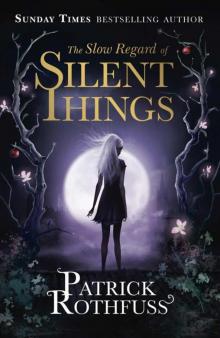 The Slow Regard of Silent Things
The Slow Regard of Silent Things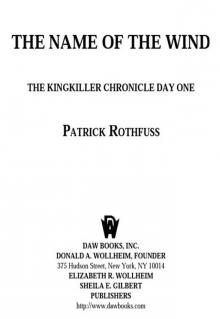 The Name of the Wind
The Name of the Wind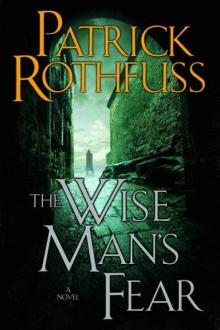 The Wise Man's Fear
The Wise Man's Fear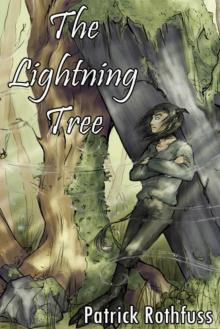 The Lightning Tree
The Lightning Tree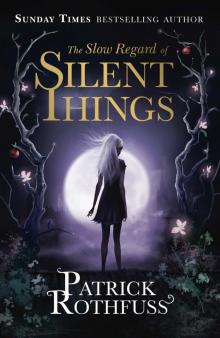 The Slow Regard of Silent Things: A Kingkiller Chronicle Novella (The Kingkiller Chronicle)
The Slow Regard of Silent Things: A Kingkiller Chronicle Novella (The Kingkiller Chronicle)![Kingkiller Chronicle [01] The Name of the Wind Read online](http://i1.bookreadfree.com/i/03/24/kingkiller_chronicle_01_the_name_of_the_wind_preview.jpg) Kingkiller Chronicle [01] The Name of the Wind
Kingkiller Chronicle [01] The Name of the Wind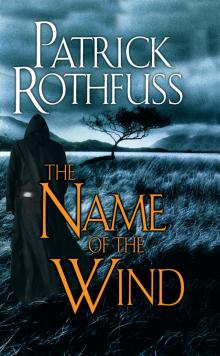 The Name of the Wind tkc-1
The Name of the Wind tkc-1